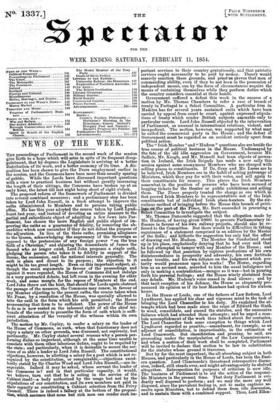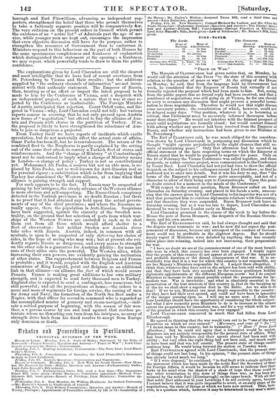NEWS OF THE WEEK.
'Trim proceedings of Parliament in the second week of the session give birth to a hope which will arise in spite of its frequent disap- pointment, that by degrees the Legislature is arriving at a better distribution of its work, and a better economy of its time. A dis- position has been shown to give the Peers employment earlier in the session, and the Commons have been more than usually sparing of gabble. While the Lords have discussed important questions with a view to practical business but 'without greatly increasing the length of their sittings, the Commons have broken up at an 'early hour, the latest till last night being short of eight o'clock. The proposed reform of the framework of Parliament is divided into several combined measures; and a preliminary step has been
-taken by Lord John Russell, in a fresh attempt to improve the oaths administered to Members and to persons takingpublic office. He has this year adopted the course taken by Lord Lynd-
hurst lastyear,- and instead of devoting an entire measure to the
,partial and sub-ordinate object of admitting a few Jews into Par- liament, has chosen the more English and public object of im-
proving the oaths as a 'guarantee of fidelity, by removing the ab- surdities which now encumber if they do not defeat the purpose of the adjuration. In lieu of the three oaths, promising allegiance to the Queen, acknowledging the supremacy of the Sovereign as opposed to the pretensions of any foreign power "on the true faith of a Christian," and abjuring the descendants of James the Second who no longer exist, Lord John proposes a single oath,
pledging the person who takes it to fidelity in support of the throne, the succession, and the national interests generally. The
oath is plain and direct to its purpose ; the objection to it
might be its too great length. Even on this important subject, al- though the main arguments in favour of the proceedings and
against it were repeated, the House of Commons did not indulge in a very protracted debate, but left room in the evening for other work, and some margin for the repose of Members at the end. Lord John threw out the hint, that should the Lords again obstruct the passage of the measure, the Commons may renew, in favour of any Member objecting to the present oaths, the course taken when Mr. Pease, by a resolution of the House, was specially allowed to take the oath in the form which his aith permitted; the House pronouncing that form to be sufficient. The power of the House
to do so is now rested on the inherent right of all the chief tri- bunals of the country to presoribe the form of oath which is suffi- cient attestation of the veracity of the witness within its own jurisdiction.
The motion by Mr. Cayley, to confer a salary on the leader of the House of Commons, as such, when that functionary does not
enjoy a salary on other grounds, was discussed, not copiously, but pertinently. Mr. Cayley stated several reasons why a person per- forming duties so important, although at the same time unable to associate with them other laborious duties, ought to be requited by the state; and particularly, when it is desirable to secure the ser- vices of so able a leader as Lord John Russell. The constitutional objections, however, to allotting a salary for a post which is not re- cognized by the constitution, or recognizable,—objections excel- lently stated by Sir Charles Wood and Lord John Russell,—are in- superable. Indeed it may be asked, whose servant the leader of the Commons is? and in that particular capacity, it would, we believe, turn out that he is acting in the service of the Cabinet itself—a body authorized by the usage but not by the stipulations of our constitution, and its own members not paid in their capacity as constituting a Cabinet selection from the Privy Council. There is indeed a fallacy at the bottom of the proposi- clows which assumes that none but rich men can render such un-
portant services to their country gratuitously, and that patriotic services ought necessarily to be paid by money. Theory would scarcely sanction those grounds, and pract'oe proves that men of commanding ability, even if they be not born in the possession of independent means, can by the force of circumstances acquire the means of sustaining themselves while they perform duties which the country considers essential at their hands.
Government suffered a defeat this week in the success of a motion by Mr. Thomas Chambers to refer a case of breach of treaty in Portugal to a Select Committee. A particular firm in Madeira has for several years sustained suits which have been carried by appeal from court to court, against expressed stipula- tions of treaty which render British subjects amenable only to particular courts. Lord John Russell objected to the intervention of Parliament, as unusual in international relations, violent, and inexpedient. The motion, however, was supported by what may be called the commercial party in the House ; and the defeat of Government must be regarded as an accident entirely apart from political action.
The " Irish Member " and " Hudson " questions also are beside the true course of political, business in the House. Undismayed by the fate of the old idle aggression on Government, because Mr. Sadleir, Mr. Keogh, and Mr. Monsell had been objects of accusa- tion in Ireland, the Irish Brigade has made a new sally this session against some anonymous Members who are charged with selling places to constituents. If Dr. Gray and Mr. Lucas are to be believed, Irish Members are in the habit of asking patronage of Ministers, which they pay for with their votes, and sell again to their constituents for money. This places the Irish Members somewhat in the position of persons who have been accused of begging tickets for the theatre or public exhibitions and selling them. The Times properly treated the charge as one which in fact proved Irish Members to be representatives not of the Irish constituents but of individual Irish place-hunters. By the cir- cuitous method of bringing before the House this breach of privi- lege on the part of the Times, Mr. Butt succeeded in procuring a Select Committee to investigate the subject.
Mr. Thomas Duncombe suggested that the allegation made by Mr. Hudson, of having given 63001. to procure Parliamentary in- fluence in favour of his own railway projects, should also be re- ferred to the Committee. But there would be difficulties in taking cognizance of a statement comprised in an address by the Master of the Rolls; and hitherto the suggestion has only had the effect of drawing out Mr. Hudson. The Member for Sunderland stood up in his place, emphatically denying that he had ever said that he had attempted to tamper with any Member of the House ; and he followed up that ,,assertion by copious professions of his own disinterestedness in prosperity and adversity, his own fortitude under trouble, and his own reliance on the judgment which pos- terity would pronounce upon his works ! The House, regarding him as an accused man, accorded to him the usual indulgence not only in making a contradiction—meagre as it was—but in pouring forth his personal feelings; and the House wisely abstained from any debate. Mr. Hudson's voice ceased in dead silence ; and by that tacit reception of his defence, the House as eloquently pro nounced its opinion as if its best Members had spoken for sixteen hours.
In the House of Lords, one of the fathers of Law Reform, Lord Lyndhurst, has applied his clear and vigorous mind to the task of bringing the Lord Chancellor to his duty. He explained the at- tempts which had been made since the reign of Edward the Sixth to weed, consolidate, and amend the statutes, and the successive failures which had attended those attempts; and he urged a reso- lute accomplishment of the work thus talked about for centuries. The Lord Chancellor took some exception to things which Lord Lyndhurst regarded as possible,—amendment, for example, as an adjunct of consolidation, is impracticable, in the estimation of Lord Cranworth. But classification and pruning, he said, are proceeding under the manipulation of the Law Commissioners; and when a section of their work shall be completed, Parliament will be invited to declare that section to be law in substitution for the statutes whose ground it traverses. But by far the most important, the all-absorbing subject in both Houses, and particularly in the House of Lords, has been the East- ern question. Lord Clanricarde's threatened retrospective discus- sion, indeed, still stands over, and might advantageously be shelved altogether. Retrospection for purposes of criticism is now idle. The business of Parliament is to aid the action of the responsi- ble Ministers in the present time. That duty Parliament is evi- dently well disposed to perform ; and we may the more say well disposed, since the prevalent feeling is, not to make captious as- saults upon Ministers, but to defend them from idle discussion, and to sustain them with a combined support. Thus, Lord Ellen-
borough and Earl Fitz william, advancing as independent sup- porters, strengthened the belief that those who permit themselves to take a factiously separate position will be comparatively few. The very criticism on the present orders in Council which permit the existence of an " active list" of Admirals past the age of ser- vice, while younger men are kept out, encourages the impression that even objective discussion will have for its purpose rather to strengthen the resources of Government than to embarrass it. Ministers respond to this behaviour on the part of both Houses by the same spontaneous completeness and frankness of explanation which distinguished their statement at the opening ; a frankness, we may repeat, which powerfully tends to draw to them the public confidence.



































 Previous page
Previous page